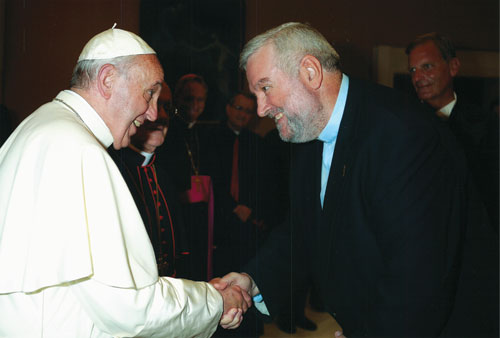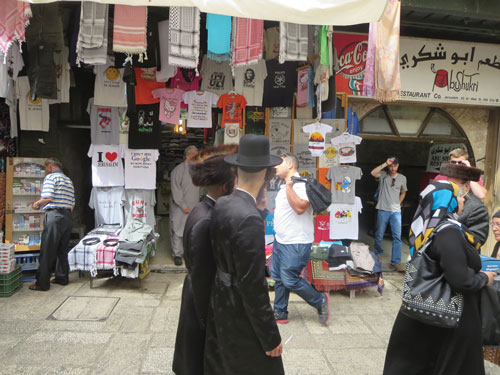Columban Fr Patrick McInerney Meets the Pope
By Fr Patrick McInerney

Meeting storekeeper in Jerusalem helped Fr McInerney reflect on where he was really from and meeting Pope Francis helped him reflect on where the center of the Church is.
When Cardinal Tauran presented the newly-elected Pope to the world from the balcony of St Peter's Basilica on the night of Wednesday, 13 March 2013 Pope Francis explained his origins as follows: ‘You know that the work of the conclave is to give a bishop to Rome. It seems as if my brother cardinals went to find him from the end of the earth.’
Just over three months later the same Cardinal Tauran invited me to Rome as one of ten delegates from the Catholic world to take part in a meeting of the 'Islamic-Catholic Liaison Committee', on 18-19 June.
The Liaison Committee members and the international Catholic and Muslim delegates were given the privilege of a meeting with the Holy Father after the regular Wednesday morning public audience. It was a clear sign of the Pope’s commitment to and support of interreligious dialogue.
Minibuses transported us to the private audience hall in the Vatican. On the Pope’s arrival, Cardinal Tauran briefed the Pope on what we, the Liaison Committee members, had been discussing. The heads of the respective delegations then introduced their members to the Holy Father. Professor Dr Hamid Bin Ahmad Al-Rifaei introduced each of the members of the Muslim delegation, then Cardinal Tauran did the same for the members of the Catholic delegation.
When it came to my turn, Cardinal Tauran introduced me to the Holy Father as a Columban priest from Australia. I said to Pope Francis, ‘Your Holiness, I too have come to Rome from the end of the earth!’ At this, the Pope burst out laughing and said, ‘Yes, but from the other part!’
I feel enormously privileged to have shared a laugh with the Pope. Filling the shoes of the fisherman is an awesome responsibility. Hopefully, our brief but humorous encounter had lightened his day.
This meeting for me was a profound moment, an experience of shared communion, two missionaries, from different ends of the earth, meeting in Rome. Where is the center of the Church? And where is the periphery?
The center of the Church is neither Rome nor the Pope. Neither are Latin America nor Australia ‘the end’ of the earth. The heart and center of the Church is the people, wherever they are, in Asia, Africa, America, Australia or Europe, and our shared task as missionaries is to reach out to them, to accompany them, to be with them.
One of the gifts the new Pope brings to the Church and to the world is his joy in meeting ordinary people and his taking pleasure in the ordinary things of life. I am sure this wells up from his deep concern for the poor. Pope Francis is simple, humble, a man of the people, for the people. I have been blessed to have met him and I pray that he will continue to lead the Church in the way of the Gospel in the days, months and years ahead.
This article first appeared on the website of the Columbans in Australia and New Zealand.
Where do you come from?
By Fr Patrick McInerney

Old Jerusalem
Australian Columban Fr Patrick McInerney is the Director of the Columban Mission Institute, Coordinator of its Centre for Mission Studies and Centre for Christian-Muslim Relations, and the Coordinator of Missiology at the Catholic Institute of Sydney. He spent the early years of his priesthood in Pakistan.
Jerusalem Old City Market
As I walked the venerable cobblestone streets of old Jerusalem where Jesus once walked, the shopkeepers called out to me, ‘Where do you come from?’ When I answered, ‘Australia’, they urged me in English to buy their wares. Such is their linguistic adaptability that had I answered, ‘France’, they would have spoken French, ‘Russia’, they would have spoken Russian, and so on.
I quickly learned to deflect their commercial enticements by asking in turn, ‘Where do you come from?’ Mostly they answered, ‘From here!’ ‘From Jerusalem?’ ‘Yes!’ Mabruk!’ (‘You are blessed!’) In the Muslim quarter the answer was often, ‘From Palestine’. This proud national sentiment was also a political statement, leading to interesting conversations about land, identity and occupation.
One day when I asked, ‘Where do you come from?’ the storekeeper replied, ‘From my mother!’ I laughed. This unexpected reply was so startling that I started using it too, to the puzzlement and amusement of my questioners, leading to very different conversations about identity, nationality and politics.
As I reflected more on this seemingly humorous answer I realized that it is actually very profound.
Each one of is us born of our mother. There is no exception, not even Jesus! If we recognized our common humanity first, rather than our national, ethnic or religious identity, then we would know that the other is my brother and sister and mother, then we would truly realize that we are all children of the one Father in heaven, then we would celebrate our national, ethnic and religious differences, not as dividing us from one another, but as enriching our shared humanity.
Among all the wonderful goods and souvenirs on sale in the markets of Jerusalem, this realization was the most precious gift of all . . . and it costs nothing other than letting go of the narrow stereotypes that limit our appreciation and opening ourselves to the riches which we are to each other. The new question becomes, not ‘Where do you come from?’ but ‘Where are you going?’
This article first appeared in the October 2014 issue of The Far East, the magazine of the Columbans in Australia and New Zealand.